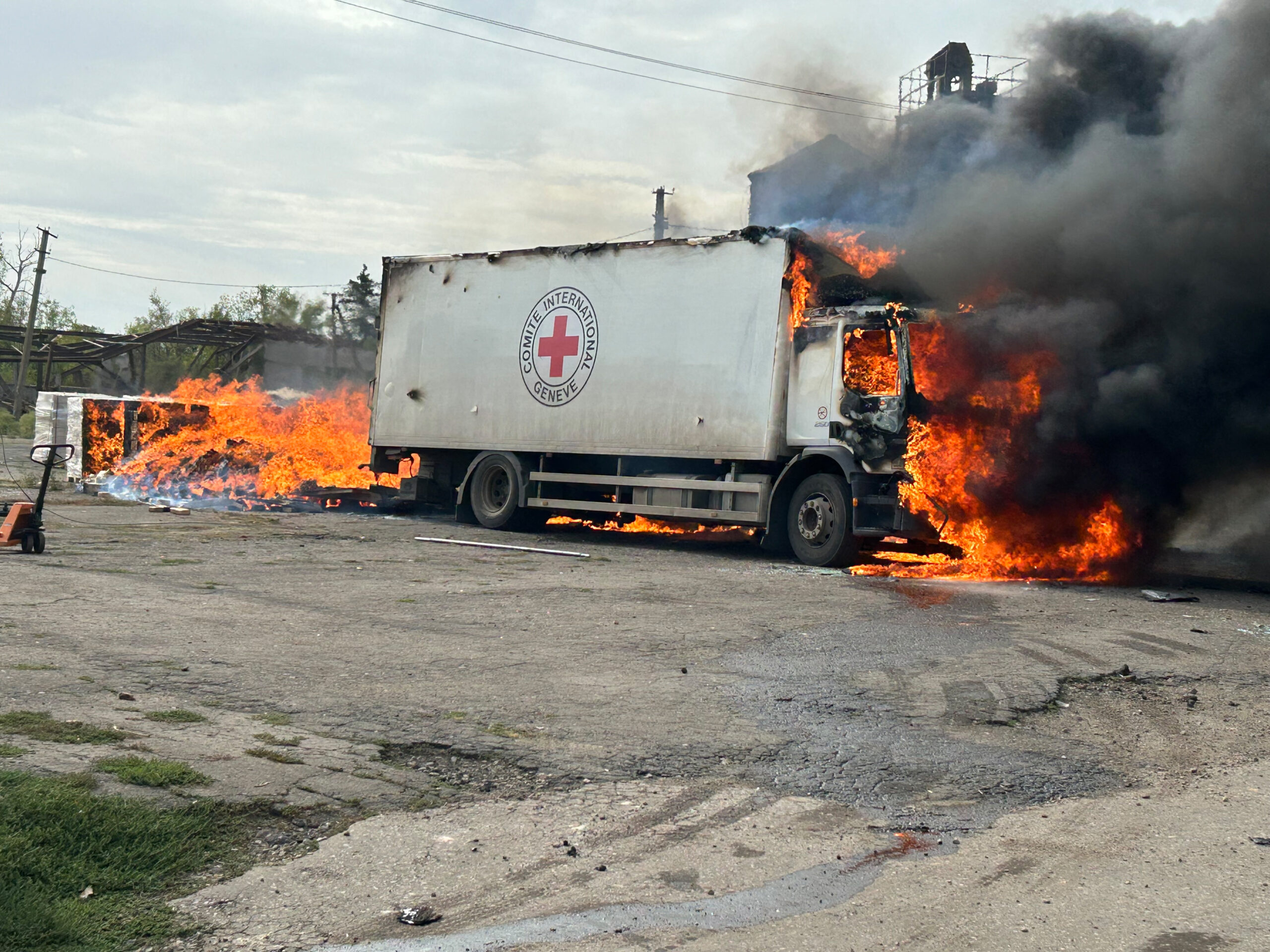"The war caught me in Kyiv. I made my decision right away – I was going to fight because it’s my country and someone came to take it."
Not the words of a soldier – but of a nurse, Tetyana Faryna. They are taken from a new documentary shot by two Kyiv Independent frontline reporters, Olena Zaskho and Francis Farrell, which is currently being toured around Europe.
The film, Can You Hear Me? The Invisible Battles of Ukrainian Military Medics, was presented in the European Parliament in Brussels on Tuesday, organised by Swedish MEP Evan Incir (S&D) and Brussels-based NGO Promote Ukraine. It deals with the physical horrors of war, but also the psychological toll it has for Ukrainians on the ground.
This allowed the two reporters to look into projects which dealt with Ukrainians’ accumulated trauma during the war, ongoing since 2014. They followed a group of frontline medics to a two-week retreat in Sweden to improve mental wellbeing, organised by the Repower charity.
For many, it was the first time they had left Ukraine since 2022, making the journey from bloody battlefields to the peaceful forests and lakes of Sweden. The documentary delves into how they navigate the contrast of war and the idyllic surroundings of the retreat, while processing their internal feelings of trauma.
"For us it was really important to understand, is it helping them? It was two weeks in Sweden and then back to the frontline. It’s about how they deal with all that," co-director and videographer Olena Zaskho told The Brussels Times.
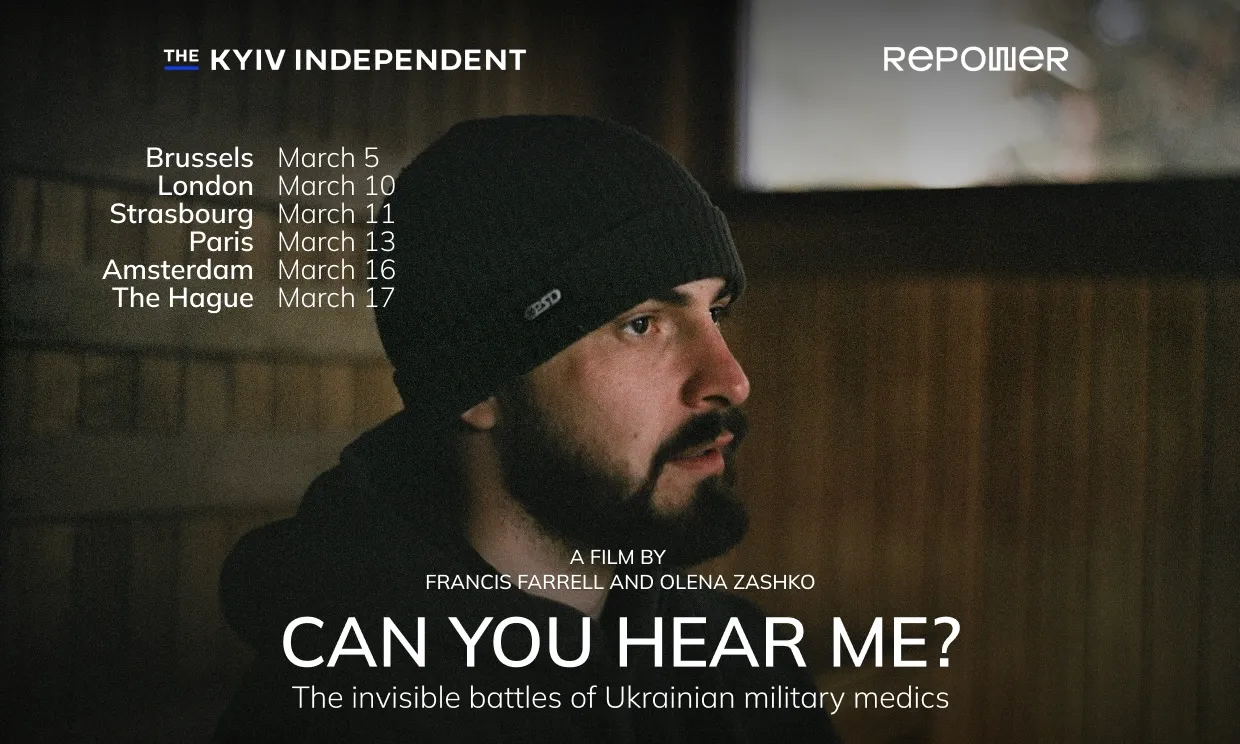
A poster for the European tour of Can You Hear Me? The Invisible Battles of Ukrainian military medics: Credit: Kyiv Indpendent / Repower
In the film, medics open up for the first time about their experiences of war: losing comrades, being in Russian captivity and persistent feelings of survivor’s guilt. The film illustrates how, even when sitting in a Swedish sauna, they cannot escape the war.
"I love the sauna scene, because it shows how they are now in really great conditions in peaceful Sweden, and they sit in this sauna and talk about war," Zashko says. "They did this throughout the two weeks away."
Frontlines to Munich
While the film talks about the experience of medics, reporting from the frontline can offer similar contrasts of feelings.
"It was the same feelings for me a few weeks ago," Zashko continues. "I was with [co-director] Francis on the frontline, and then went to report from the Munich Security Conference."
"I was like: two days ago I was sleeping in the car near the frontline, and today I’m listening to JD Vance’s speech in Munich. It blew my brain because they are such differing realities."
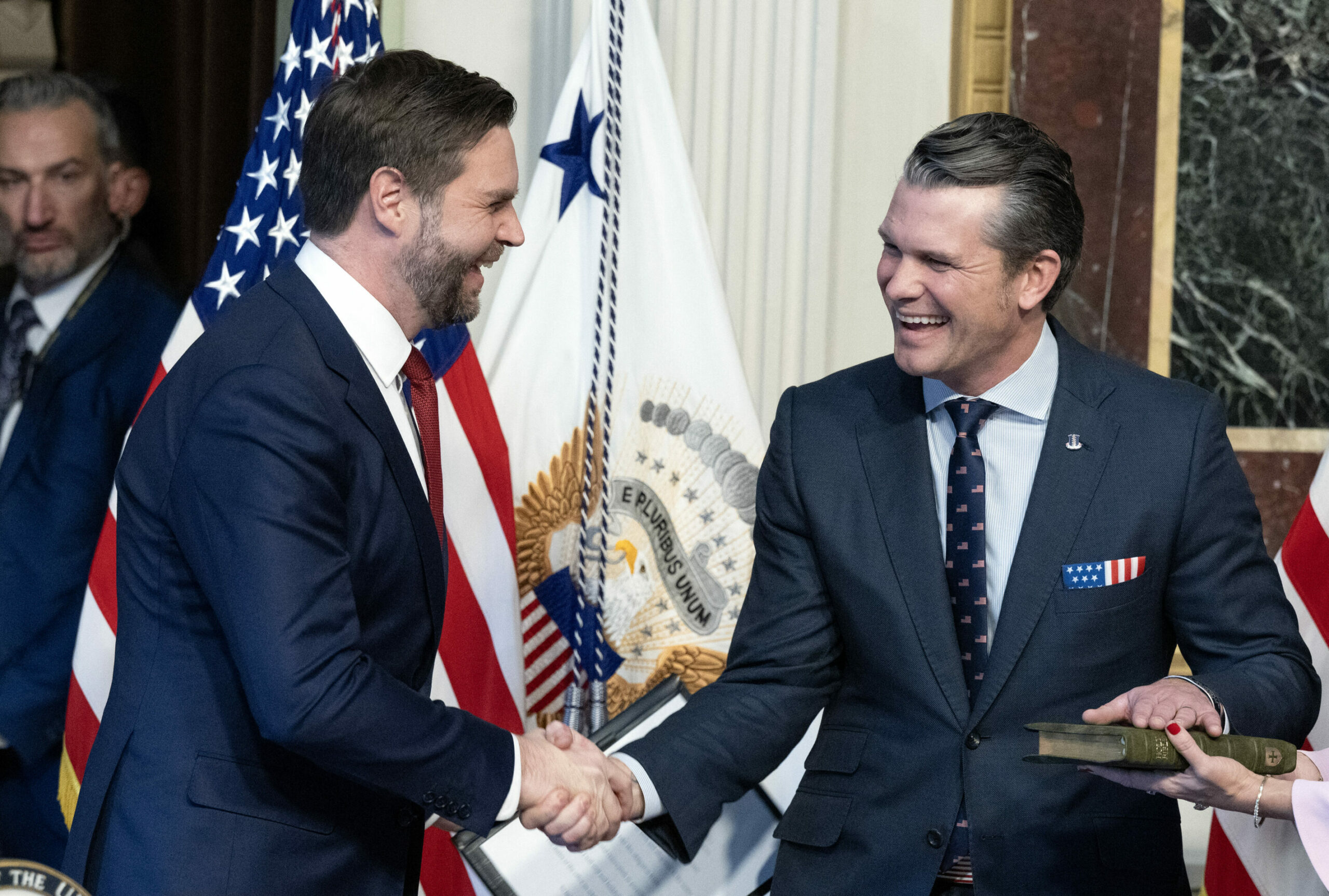
United States Vice President JD Vance (left) shakes hands with US Secretary of Defense Pete Hegseth. Credit: Ron Sachs/ Belga
One scene, not included in the documentary, shows the head of the Repower charity speaking to some guys who remind him they could all be dead in a month.
"It actually happened," Zashko says. "At least four people shown in the documentary were killed after."
PTSD is constant
For Francis Farrell, co-director and reporter at the Kyiv Independent, the film shows the world that Ukraine's resistance is about people – not just in terms of casualties and losses, but the inner resources they have to keep on going under extreme duress.
"We've been working on the front lines for over two years. There is this challenge that every story melts into one another," Farrell told The Brussels Times. "You have just soldiers in trenches and civilians in basements, and it was clear that people lacked the kind of deeper understanding of who these people are."
Farrell points to the frequent use of post traumatic stress disorder (PTSD), but stresses that this is mostly in the context of the veterans' experiences. "Here, the main challenge is that there's no PTSD when it's still constant, it's ongoing."
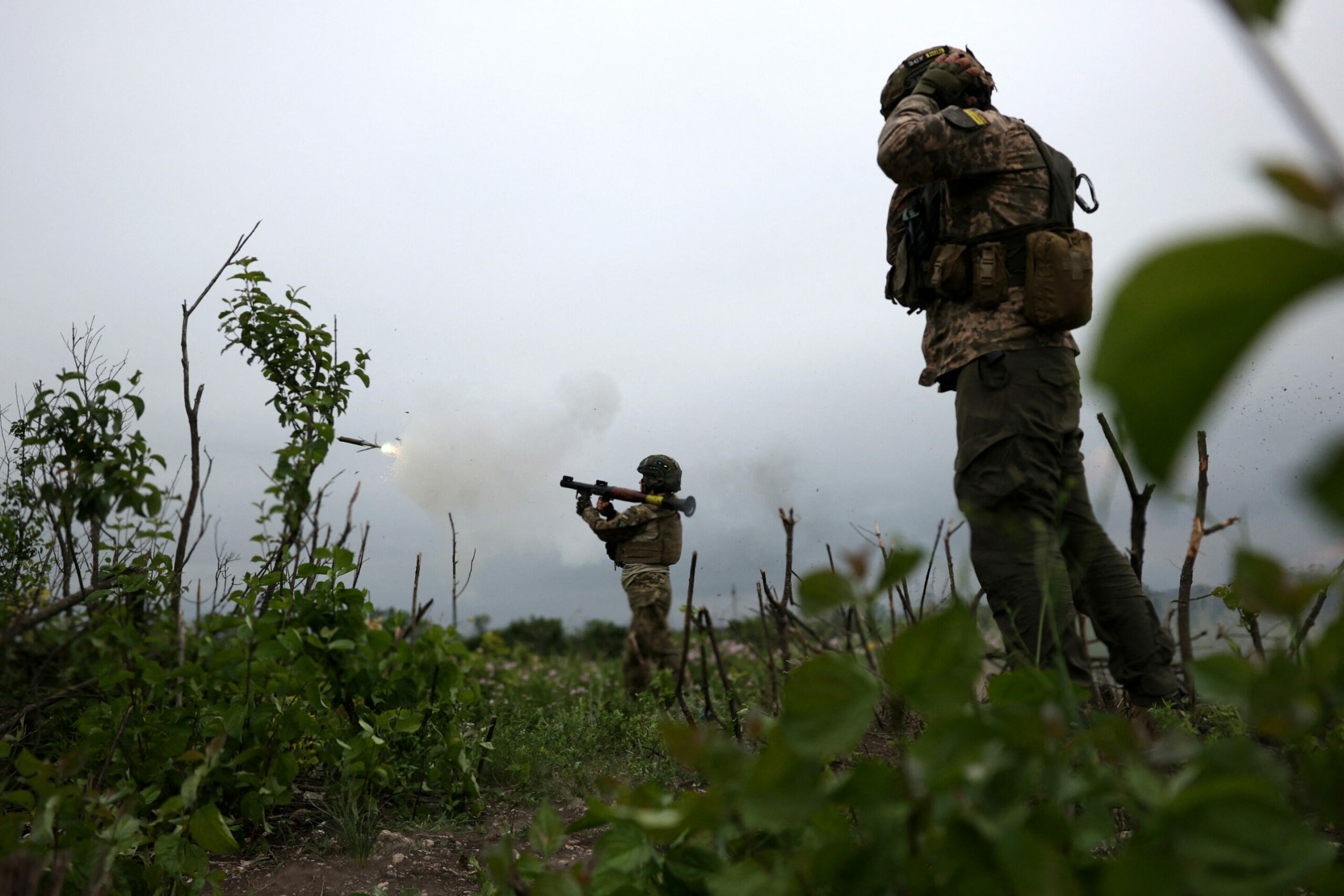
Ukrainian soldiers of the 28th Separate Mechanized Brigade fire a grenade launcher at the front line near the town of Bakhmut, Donetsk region, on 17 June 2023. Credit: Belga / AFP
'Europe is not ready'
The introduction of drone warfare has also presented new dynamics in war, something neither Europe nor the US are ready for. "Drones are terrifying, I'm not going to lie," Farrell continues. "Of course, medics are working from a little bit further back. But right now there's a big problem with Russian drones hunting vehicles."
These drone strikes are indiscriminate, targeting civilians, medics, aid workers and journalists. "It's important to understand that there are now enough drones on each side, and they are high-precision weapons," Farrell explains. "There's never been a time where there's been an ability to expend multiple high-precision weapons just on one soldier walking around."
At the Kyiv Independent, the two travel to the frontline by car from the capital. They go without security or fixer and "work like locals". But the advancement of drone warfare has made their job more dangerous.
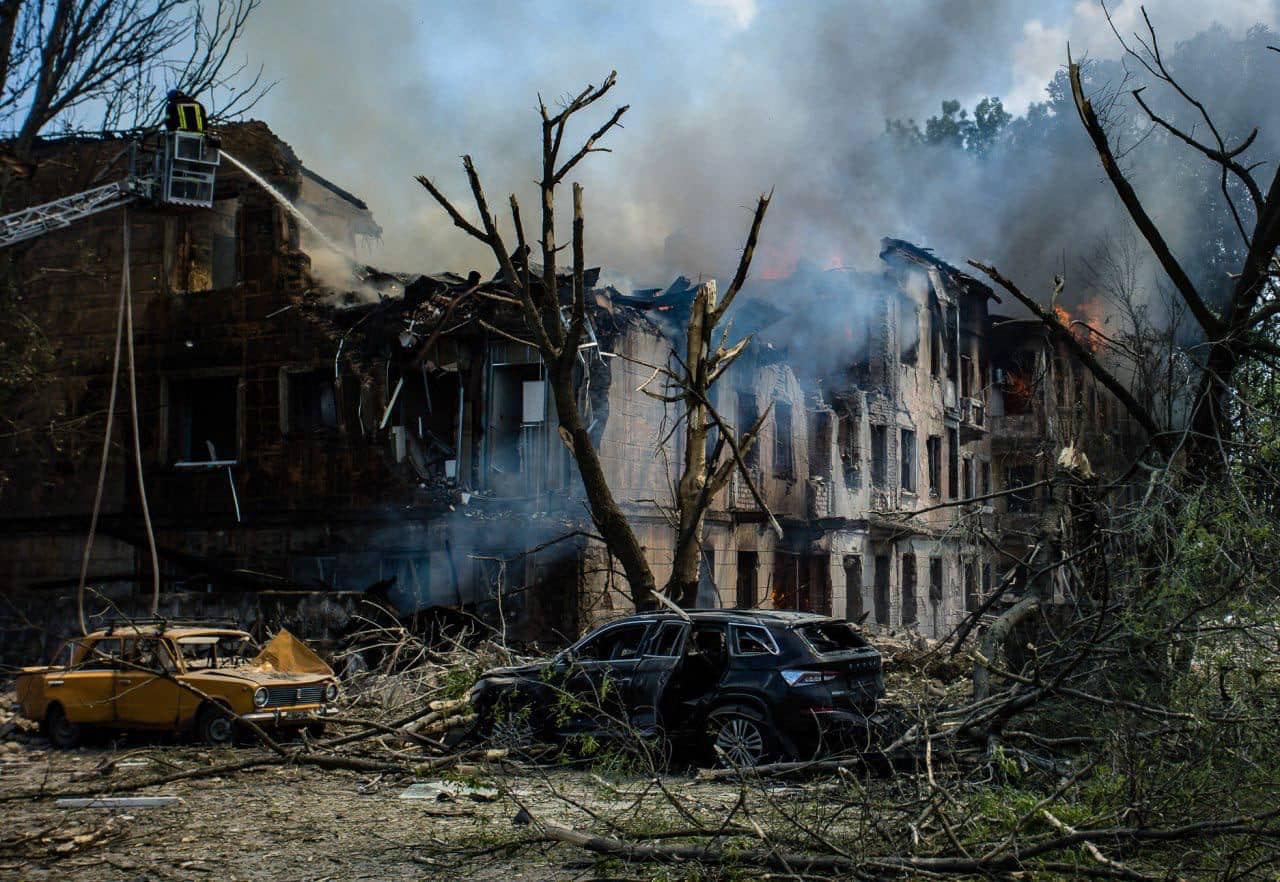
Hospital in Dnipro after Russian missile attack on 26 May 2023. Credit: Ministry of Internal Affairs of Ukraine
"The main problem is safety. Even two years ago, I could work, for example, in the middle of the city of Bakhmut [scene of a major battle in 2022]. We could walk around pretty freely. Of course, there's heavy artillery shelling, and you take cover," Farrell says. "Now anything within the 10 kilometre zone is something where drones can hunt you and it makes working a lot more difficult."
Farrell argues this should lead European countries to the pragmatic argument for supporting Ukraine, beyond it being the right thing to do. He underlines that the experience of the soldier now is one of the "most terrifying and brutal" environments for battle in the history of warfare.
“If you leave all the understanding and technology of how modern drone warfare is waged into the hands of Russia, because you couldn't do enough to help Ukraine, then you're in big trouble for the rest of this century.”
Trump's comments
When asked about Trump’s attacks on Zelenskyy, the two directors believe that last week’s events have strengthened the Ukrainian president and united the country.
"I feel that now it's the same situation as it was in 2022, when all the world told us that you have only three days and Kyiv will fall. At that time, all Ukrainians were really united. It really helps us and all soldiers, all people, civilian people too. And it really boosted our spirits," says Zashko.
"There's been a rallying of support for the president because he stuck up for the country's dignity. It's pretty simple," added Farrell.
The film is being shown on Wednesday 5 March 2025 in Brussels at Cinema Aventure, registration required. It will then travel to London, Strasbourg, Paris, Amsterdam and The Hague. All screenings will be followed by discussions with the film’s directors. The documentary can also be watched online.

